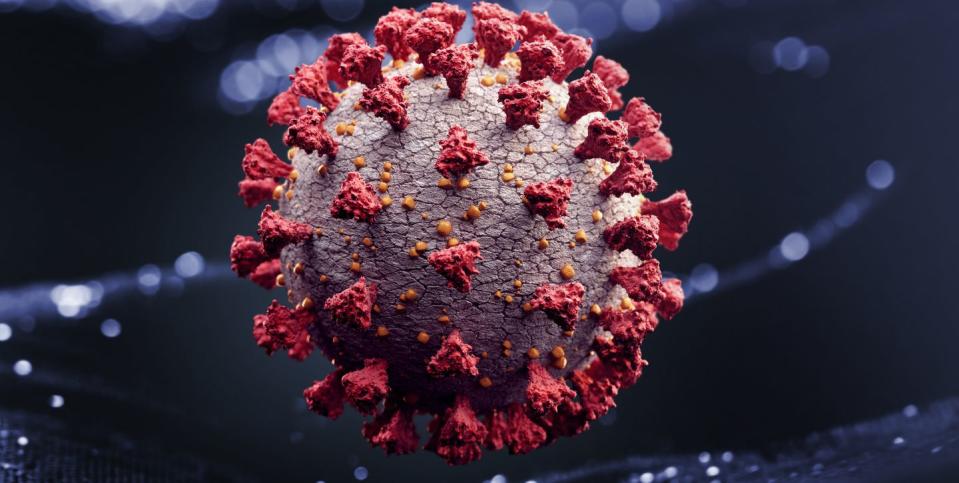Is Omicron Reinfection Possible? Here’s What Experts Want You to Know
- Oops!Something went wrong.Please try again later.

We’re now entering year three of pandemic life and are facing a massive spike in cases in the U.S. due to the rapid rise of the highly-infectious Omicron variant. With public health officials warning that everyone will likely be exposed to Omicron at some point, it’s only natural to wonder if you can get reinfected with COVID-19 thanks to the variant.
Reports of reinfection are already popping up on social media, and Mexican president Andres Manuel Lopez Obrador announced this week on Twitter that he’s been infected with COVID-19 again after having the virus early last year.
But how likely are you to get reinfected with COVID-19 during the Omicron wave, and can you get Omicron twice? Here’s what doctors know right now.
What is a reinfection, exactly?
Reinfection means that you got sick once, recovered from the illness, and then later got that same illness again, the Centers for Disease Control and Prevention (CDC) explains. The CDC says that some COVID-19 reinfections “are expected,” but that scientists are still trying to learn more about reinfections with the virus.
Can you get infected with Omicron after having a previous variant of COVID-19?
“Yes, it’s definitely possible,” says Thomas Russo, M.D., professor and chief of infectious disease at the University at Buffalo in New York.
The CDC says that people who have been vaccinated against SARS-CoV-2, the virus that causes COVID-19, and those who have actually had the virus have a “low risk of subsequent infection” for at least six months. Meaning, you should be protected for six months after having COVID-19. Beyond that, though, it’s hard to say.
Video: Everything to know about the Delta variant
There’s a lot of variation from person to person and factors like how severe of a course of COVID-19 you had the first time, different variants that are circulating, and your individual immune response can all play a role, says William Schaffner, M.D., an infectious disease specialist and professor at the Vanderbilt University School of Medicine.
“We’ve had a number of well-documented second infections with COVID,” Dr. Schaffner says. “The data regarding Omicron specifically is just coming out, but there’s no reason to think that Omicron in this regard is any different than the previous variants.”
Martin J. Blaser, M.D., Henry Rutgers Chair of the Human Microbiome and director of the Center for Advanced Biotechnology and Medicine at Rutgers University, agrees. “Just as we have seen over the course of the pandemic, one infection does not necessarily protect from a further infection,” he says.
Omicron also has a large number of mutations—including at least 34 on its spike protein, which is what the virus uses to latch onto your cells—and “it’s so very contagious,” Dr. Schaffner says. “People shed so much virus with Omicron. As with other infections, sometimes immunity can be swamped if the exposure is very intense," he adds.
In fact, recent research from the Imperial College London found that the risk of reinfection with Omicron is 5.4 times higher than it was with Delta, the previous dominant COVID-19 strain. Researchers specifically found that protection against reinfection by Omicron from a past COVID-19 infection could be as low as 19%.
“One of the key features of Omicron is that it’s much more resistant to immunity, whether vaccine-induced or caused by previous infection,” Dr. Russo says.
Can you get Omicron twice?
“Yes, you can get Omicron twice,” says Stanley Weiss, M.D., professor at the Rutgers New Jersey Medical School and the Department of Epidemiology at the Rutgers School of Public Health. He cites a recent lecture he attended from a virologist in South Africa, where Omicron first emerged, who said that doctors in the country had seen several people who had Omicron reinfections.
“Omicron is highly contagious and it would appear to not induce fantastic protective immunity,” Dr. Weiss says.
Exactly how common Omicron reinfection is remains to be seen, given that this is still a fairly new COVID-19 variant, Dr. Russo says. “If you had a mild infection, didn’t get a very good immune response, and you get exposed again with a big dose of the virus, it’s definitely possible,” he says.
Time is likely a big factor, too, Dr. Blaser says. “The longer the interval from the last infection, the less protection you have from that infection,” he says. “Time does make a difference.”
How to protect yourself from Omicron if you’ve been relying on natural immunity
As the CDC points out, data is still being collected on how much protection you get from a previous infection and how long it lasts. But the medical community generally advises that you get vaccinated against COVID-19 after having the virus. “Once your symptoms resolve, it’s OK to go ahead and get vaccinated,” Dr. Russo says.
Something to keep in mind: One study found that, in people who already had COVID-19, those who do not get vaccinated after recovering are more than twice as likely to get the virus again than those who get fully vaccinated after their recovery.
Research has also shown that getting vaccinated against COVID-19 after you’ve had the virus gives you a high level of protection—including a nearly 50-fold increase in neutralizing antibodies.
“People who have been naturally infected should get vaccinated,” Dr. Schaffner says. “You will end up with very high levels of antibodies.”
This article is accurate as of press time. However, as the COVID-19 pandemic rapidly evolves and the scientific community’s understanding of the novel coronavirus develops, some of the information may have changed since it was last updated. While we aim to keep all of our stories up to date, please visit online resources provided by the CDC, WHO, and your local public health department to stay informed on the latest news. Always talk to your doctor for professional medical advice.
You Might Also Like

